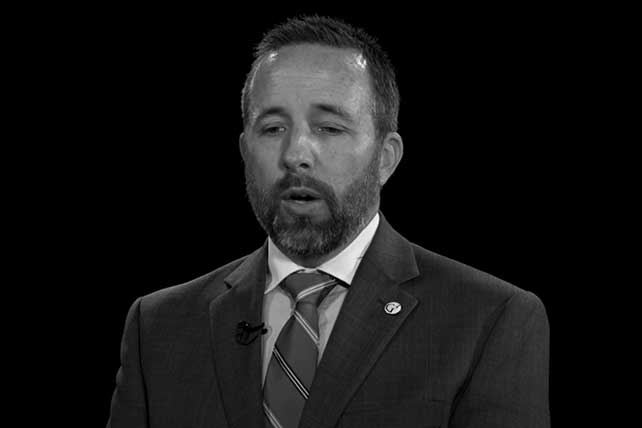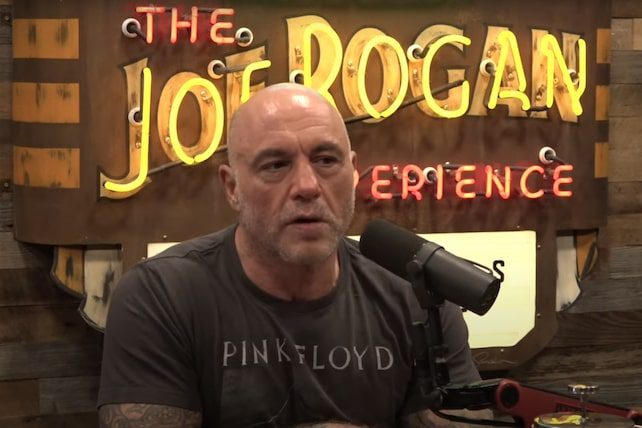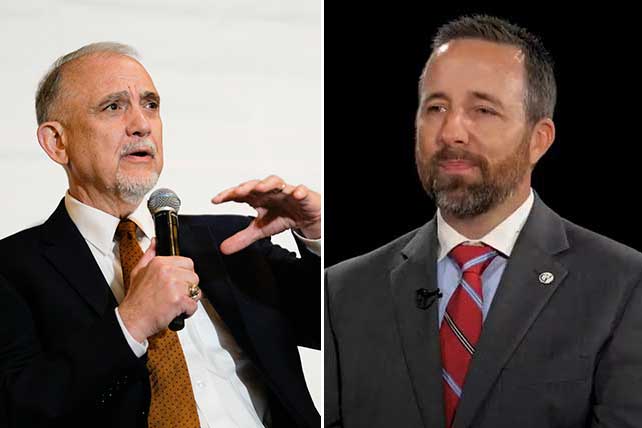(RNS) — Less than four months after a Nazi-like salute cost him his license in the Anglican Catholic Church, the Rev. Calvin Robinson, a priest and British transplant living in Grand Rapids, Michigan, has been granted a temporary license to act as a priest from another small Anglican jurisdiction.
In January, at the end of a speech at the National Pro-Life Summit, Robinson thumped his chest and saluted quickly to the right, arm extended, palm down. Viewers were quick to link the gesture with Elon Musk’s controversial salute during an Inauguration Day speech at Capitol One Arena, which was also compared to a Nazi salute.
Robinson was dismissed as a priest soon afterward by the Anglican Catholic Church. He had been serving since fall 2024 as rector of St. Paul’s Anglican Church in Grand Rapids, Michigan.
RELATED: Calvin Robinson Defrocked for Making Gesture Resembling Nazi Salute
On Monday (May 12), the presiding bishop of the Reformed Episcopal Church, who also oversees its Diocese of Mid-America, the Most Rev. Ray Sutton, granted Robinson a one-year license to serve as a priest. The license will allow Robinson to resume work as rector of St. Paul’s. The Reformed Episcopal Church is a distinct jurisdiction within the Anglican Church in North America, known as ACNA, which broke away from the Episcopal Church in 2009.
“I know Bishop Ray Sutton to be a godly shepherd, and I am thankful that he has provided St. Paul’s with Provisional Oversight and Pastoral Care, and me with Episcopal Sanctuary. St Paul’s can now continue ministering to the community of Grand Rapids, in the English expression of the Catholic faith. All for the greater glory of God,” Robinson told Religion News Service.
On May 4, St. Paul’s Anglican disaffiliated with the Anglican Catholic Church, and Sutton will provide oversight of St. Paul’s as it determines its future affiliation. “I have licensed their rector, Calvin, to continue to serve a parish that wants him to continue to be their pastor,” he wrote.
While Sutton made clear the arrangement doesn’t grant Robinson or his parish membership in the Reformed Episcopal Church (or, by extension, ACNA), it prompted concerns from ACNA Archbishop Steve Wood about Robinson’s public profile. The Reformed Episcopal Church is self-governing but operates under the umbrella of the Anglican Church in North America, according to a spokesperson for the denomination.
“I am concerned to have the Anglican Church of North America affiliated with a leader whose public comments and persona consistently fail to exhibit the love and grace of Jesus Christ,” said Wood in a statement.
“I have concerns about Rev. Robinson’s ability to uphold the full commitments of our Anglican tradition, and his ability to model the Christ-like virtues of peace, patience, gentleness, goodness and love I know all of our permanent licensed clergy abide by in the daily exercise of their priestly duties. I do not personally believe The Rev. Robinson is a good representative of the Anglican Church in North America.”
RELATED: Calvin Robinson Was Not ‘Defrocked,’ Says Denomination; Robinson Seeks Audience With Archbishop
In response to Wood, Robinson said he’s spoken at several ACNA events and finds ACNA clergy and laity to be “faithful brethren in Christ.”
“I do not know Abp Steve Woods, but I look forward to getting to know him. I have been praying for a strong shepherd for the ACNA for some time; I am hopeful he is that man,” Robinson wrote. “It will take all of those virtues of peace, patience, gentleness, goodness and love to lead the ACNA back into the fullness of the Anglican tradition and away from the modern error of female ordination.”
Robinson has criticized the Anglican Catholic Church’s handling of the incident, saying the revoking of his license happened “without conversation, without any disciplinary hearing, without any opportunity to apologize or to repent or explain.”
The Anglican Catholic Church insists Robinson’s license was not revoked because of a single act, or without warning. In a statement released by the Anglican Catholic Church in February, the ACC said Robinson was “warned repeatedly that his continued partisan political activity was inconsistent with his ministry” and was “told that his license was at risk because he was continuing to act as a political social media personality.” The ACC also cited Robinson’s alleged antisemitic statements as reason for his dismissal.
“Priests are certainly called to support the Church’s teaching on the sanctity of life and on a range of other doctrinal issues; but they are not called to provoke, to troll, or to behave uncharitably toward their opponents,” The Anglican Catholic Church said in the statement.



 Leadership is really tough. Good
Leadership is really tough. Good 

























